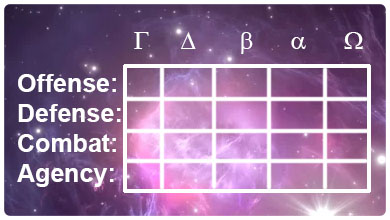Gale Power Grid
While Marvel's power grid is a rather useful standard with documented benchmarks for each score, some people will feel marvel's criteria isn't adequate for representing their respective character's qualities. Feel free to use this if you find it suits your needs.
Following is a description for each of the traits and benchmark points.
NOTE: On stats with "two bars," the blue one refers to what they can reliably and consistently do on their own power, whereas the red bar implies the requirement of specific circumstances, and are things the hero either will only do a handful of times per "season" or they have no control over.
The Scale
- Γ (Gamma): Local issue. The police can bring this character down if needed.
- Δ (Delta): City issue. Bringing this character down takes at least a well-equipped SWAT team.
- β (Beta): National issue. It takes expensive E-SWAT teams (only available at major metropolii) just to pose resistance and only other metahumans have a certainty of bringing this character down.
- α (Alpha): Global threat. This character is the reason why super teams exist.
- Ω (Omega): Peerless. Power may or may not be infinite, but it is immesurable.
The Five Attributes:
Offense
The hero's capacity for damage, from super-strength to artillery.
- Γ: Human, perhaps armed with a small arm at most.
- Δ: Can punch through walls or lift a car. Examples: Back Alley Brawler, Captain Mako.
- β: Can punch through steel or lift a trailer. Examples: Foreshadow, Rikti weaponry, Ghost Widow.
- α: Can punch through super alloy or lift the Golden Gate. Examples: Statesman, Black Scorpion, Director 11, Nightstar/Luminary.
- Ω: Will blow up planets and above as story demands. Examples: Rularuu the Ravager, Hamidon.
Defense
From mundane body armor to regeneration, Resilience shows the kind of damage a hero is expected to be able to shrug off in combat.
- Γ: Human.
- Δ: Bullet Resistant. Examples: Blue Steel, Manticore, Bobcat.
- β: Artillery Resistant. Examples: Marauder, Positron, Kheldians, Black Scorpion, Director 11
- α: Nuke Resistant. Examples: Statesman, Lord Recluse, Hero-1, the Rikti Mothership.
- Ω: Indestructible. Examples: Hamidon, Siege, Tyrant/Statesman.
Combat
Regardless of whether armed or unarmed, combat ability reflects the kind of rivals the hero is expected to be able to take down.
- Γ: Untrained: Unless the hero possesses resources that "auto-lock" on targets, they'll lose all and every fight.
- Δ: Trained. While not Bruce Lee or John Rambo, the hero is assumed to be able to hold their own in most situations. Example: Miss Victory, any Longbow agent.
- β: World Class. As long as the opponent doesn't possess any form of super-speed or super-reflexes, the hero can take them down. Examples: Manticore, Blue Steel.
- α: Inhuman. Possessing a form of preternatural awareness or speed is just the base requisite for picking a fight with this hero. Examples: Foreshadow, Synapse, Bobcat.
- Ω: Invincible. With the right tools/weapons, the hero will trivialize any challenge based on combat. If fighting another omega-class fighter, it's either a coin toss or up to the writer. Examples: Director 11, Back Alley Brawler/Marauder.
Agency
Agency is the hero's ability to affect a story's events on their own power, regardless of the tools they use to do it (guile, superpowers, luck, etc).
- Γ: Either useless or reluctant to get involved in anything. Five-year olders usually point out at their regular mistakes and the only way they can progress through a story is via constant plot contrivances that get no input from them at all. Examples: Fusionette.
- Δ: Character can solve their own Nancy Drew mysteries and often has means of transportation within the city. Examples: Miss Liberty.
- β: Character needs no help finding an enemy's secret weakness (when applicable) and often trivializes most detective work. They often have means to operate globally. Examples: Sister Psyche, Bobcat.
- α: Character often works around predicaments impossible for the non-supepowered. The laws of physics are rather "suggestions" to the character. They often have means to operate across worlds and dimensions. If non-superpowered, they're The Goddamn Batman. Examples: Numina, Manticore, Mother Mayhem, The Clockwork King, Blue Steel.
- Ω: The hero is more of a plot device than a character. They can and will do anything as the story requires (mainly, whenever the writer paints themselves into a corner), including but not limited to: Impossible leaps of logic, implausible Rube/Goldberg schemes to punch far above their weight-class, or outright plain omnipotence. Examples: Dream Doctor, Television, Dark Watcher, Dr. Aeon, Stephen Sheridan.
